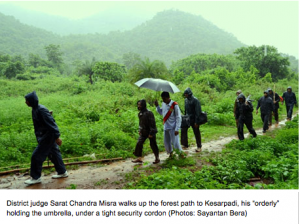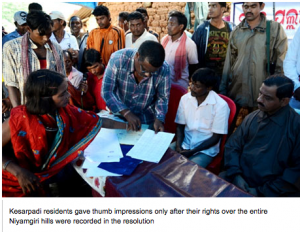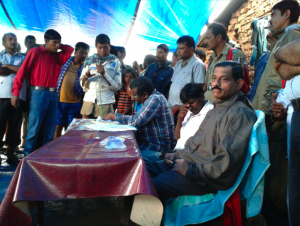
25th July 2013
The prospects for Vedanta’s Niyamgiri mine are looking even more remote as the results of the Palli Sabhas being held on the command of the Supreme Court’s April judgement on the mine, flood in.
Five Palli Sabhas have now been held, affirming the thundering NO to the proposed mine expressed in the initial Serkapadhi meeting. In fact the villagers strengthened the resolution, becoming wise to the administrations attempts to make them sign resolutions they may not fully understand, and denying them photocopies, as had occurred in the first Palli Sabha. According to an article by ‘Down to Earth’ at the beginning of the Kesarpadhi meeting on Monday, Dondu Kutruka, a young Dongria Kondh ‘demanded the joint verification report by the state government, that proposed to settle the villagers’ community and religious claims to the forests, be rejected. “You people wrote everything in the office and never came to the village to verify. Now write whatever we say correctly and read it out. You cannot make a fool of us every time,” he warned the chair.
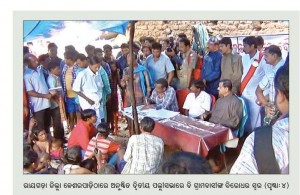 33 of 36 voters (10 men and 23 women) attended the meeting in this small mountain village, and unanimously voted on a resolution which rejected the Odisha state government’s proposed settlement of community and religious claims, and opposed any mining on the mountain. This means the community reject outright the idea that they could be compensated for the impacts of mining, which may have allowed the mine to go ahead with certain conditions. The state government were intending to settle claims with tiny allocations of land, such as just 0.11 acres for local deities, which the Dongria have repeatedly stated cover the whole mountain.
33 of 36 voters (10 men and 23 women) attended the meeting in this small mountain village, and unanimously voted on a resolution which rejected the Odisha state government’s proposed settlement of community and religious claims, and opposed any mining on the mountain. This means the community reject outright the idea that they could be compensated for the impacts of mining, which may have allowed the mine to go ahead with certain conditions. The state government were intending to settle claims with tiny allocations of land, such as just 0.11 acres for local deities, which the Dongria have repeatedly stated cover the whole mountain.
The full Down to Earth Report is included below.
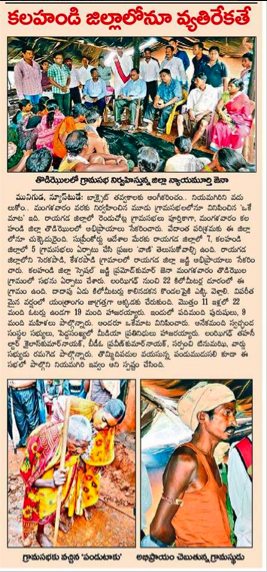
On Tuesday 23rd July the third meeting was held in Tadijhola, a small cow-herding village in Kalahandi district which is not occupied by Dongria Kondh. Despite the non tribal community 19 out of 22 voters were present at the meeting and all once again unanimously opposed the mine. This included 87 year old Sugri Gouda, who uttered three words – “Won’t give up Niyamgiri” – which received a cheer from those present.
Once again, mistrust in the Kalahandi distric judge Pramod Kumar Jena, was high, as attendees accused him of not writing exactly what they had said, and were cautious about signing the resolution he presented.
A note from Susanta Dalai, an observer of the meeting summarises the views of Tadijhola residents that they would sacrifice themselves to save the mountain, which they also worship, and which gives them life and livelihood. It was also stated that ‘They strictly said ,if Vedanta will make plan for bauxite we all will go and kill to everyone in the Company members.’
Full report from Down to Earth below, as well as the note from Susanta Dalai.
In Kunakadu village on Thursday 24th July 21 out of 22 present rejected unanimously Vedanta’s mining plans in Niyamgiri. Suna Majhi stated:
“Do not try to take our Niyamgiri. We will fight like Birsa Munda, Rendo Majhi. Write what we say. We do not want your five decimile of patta..the whole Niyamgiri is ours.”
and:
“Has the government created Niyamgiri that you can do whatever you like with it? The whole Niyamgiri mountain is to us what Jaganath Temple is to you.”
Full report from Down to Earth below and linked here.
In Palberi on 25th July 14 out of 15 voted against Vedanta. Gata Majhi noted the unity between different groups living on and around Niyamgiri:
“Niyamgiri does not discriminate. We Adivasis, Dalits, and Paika, Gauda and others drink the water, breathe the air from it..nurturing the whole land.”
Meanwhile in Ijurupa, a village with only one registered voter, where the state government chose to hold one of the twelve Palli Sabhas extra huts are being built to house relatives of the villagers and make it look larger. Despite these manipulations by the Odisha state government, the Palli Sabha’s continue to vote against the mine. If Vedanta cannot mine the mountain it will lose a 40,000 crore rupee investment, which it made with no local agreement, or legal assurance for the mine project.
Down to Earth
Second palli sabha in Niyamgiri deals double blow to Odisha government
Kesarpadi residents cancel government’s settlement of community forest rights; unanimously reject Vedanta bauxite mining proposal
Two days of pouring rain did little to dampen the spirit of the forest people of Niyamgiri. The second palli sabha or village council meeting at Kesarpadi in Rayagada district took a critical decision today: it cancelled Odisha state government’s proposed settlement of community and religious claims to the forests. The tribal hamlet also unanimously rejected the proposed bauxite mining inside the forest hills.
This double blow to the state government and Vedanta Aluminium Limited follows close on the heels of the first palli sabha at Serkapadi where residents rejected the mining proposal on July 18 last week. Following up on the Supreme Court order of April 18, the Odisha state government selected 12 villages—seven from Rayagada and five from Kalahandi district—to take a call on the proposed bauxite mining inside Niyamgiri hill range and whether it will infringe on their religious and cultural rights.
A joint venture of the Orissa Mining Corporation Limited (OMCL) and Sterlite Industries, the Indian arm of the London Stock Exchange-listed Vedanta, wants to mine the forests for bauxite, to feed Vedanta’s alumina refinery on the foothills of Niyamgiri hills at Lanjigarh. At stake is 72 million tonnes of estimated bauxite deposits and an investment of Rs 40,000 crore by Vedanta in the state of Odisha.
The palli sabha at Kesarpadi started almost forty minutes late because of rains. District judge of Rayagada, Sarat Chandra Misra, appointed observer by the Supreme Court, had to brave the rains and walk on the narrow forest path to reach Kesarpadi. Of the 36 voters in the Dongria Kondh tribal hamlet, 33 were in attendance—23 women outnumbering the 10 men.
Right at the beginning, Dondu Kutruka a young Dongria Kondh demanded the joint verification report by the state government, that proposed to settle the villagers’ community and religious claims to the forests, be rejected. “You people wrote everything in the office and never came to the village to verify. Now write whatever we say correctly and read it out. You cannot make a fool of us every time,” he warned the chair.
On July 6, a team from the state government visited Kesarpadi to prepare a joint verification report to settle the villagers’ community and religious claims to the forests. The settlement report arbitrarily allotted community claims, for instance between 0.5 to 1.9 acres (one acre equals 0.4 hectare) for the five perennial streams in the village. The entire religious rights were settled with a mere 0.11 acres for local deities (PDF of verification report).
“The entire Niyamgiri spread over Rayagada and Kalahandi is ours. You can take our life but we will not give it for mining,” thundered Kutruka. “Your temples are made of brick and cement. Ours are made of earth, leaves and the forests,” said the bejuni, village priestess of Kesarpadi.
All the 33 residents of the village took the mike to reject proposed bauxite mining. “We get our Kosla and mandiya (minor millets) from the dongar (shift and burn cultivation plots on hill slope). These jungles are as much ours as it for the leopards and bears. We will not give it for mining,” said the village forest rights committee president Suku Kutruka.
Before signing the minutes of the meeting, Kesarpadi residents ensured that their religious and community claims to the entire Niyamgiri is recorded in the resolution. They also claimed the proposed bauxite mining site of Dhangrabhata or Niyamdongar—the mythical birthplace of their ancestral kin and principal deity Niyamraja—as part of their religious and cultural rights. (See Kesarpadi Palli Sabha resolution/ minutes of the meeting, download pdf)
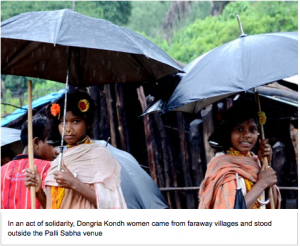 “We don’t want land titles in portions of the forests. Why should we, when everything belongs to us?” asked Lado Sikaka, leader of the Dongria Kondh who walked over three hours to reach Kesarpadi in time for the palli sabha. As happened in the previous palli sabha at Serkapadi, this one also saw several other tribals arriving at the venue and sitting outside in solidarity.
“We don’t want land titles in portions of the forests. Why should we, when everything belongs to us?” asked Lado Sikaka, leader of the Dongria Kondh who walked over three hours to reach Kesarpadi in time for the palli sabha. As happened in the previous palli sabha at Serkapadi, this one also saw several other tribals arriving at the venue and sitting outside in solidarity.
“People today rejected the faulty government report that tried to limit their community and religious claims. The mood is upbeat and we are expecting similar resolutions from all the other palli sabhas,” said a jubilant Bhala Chandra Sadangi, CPI (ML) leader and advisor to the Niyamgiri Suraksha Samiti, the local resistance group.
Tomorrow, Tadijhola, a non-tribal village in Kalahandi district will take a call on the mining proposal. The village can only be reached on foot, an hour’s walk through forest hills from the nearest docking point for cars and bikes. Hope the rains won’t play too much of a spoilsport.
Down to Earth
Non-tribal Tadijhola rejects mining proposal at Niyamgiri
Sayantan Bera
Palli sabha takes a dig at Odisha government for lack of education and health facilities
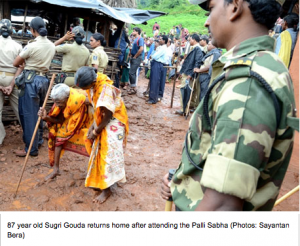 In a repeat of the previous two palli sabha decisions, the non-tribal forest hamlet of Tadijhola unanimously rejected proposed bauxite mining in the Niyamgiri hills today.
In a repeat of the previous two palli sabha decisions, the non-tribal forest hamlet of Tadijhola unanimously rejected proposed bauxite mining in the Niyamgiri hills today.
Nineteen of the 22 voters in the village were present at the palli sabha or village council meeting, including eighty-seven year old Sugri Gouda. Hard of hearing and barely able to stand on her own, she insisted on signing the resolution before leaving the meeting venue. Three bare words she uttered drew a cheer from those present: Niyamgiri dibu nai (won’t give up Niyamgiri). Gauda was the also most sought after by media, with a slew of video cameras following her fragile steps as a family member walked her home.
Tadijhola, a forest hamlet in Kalahandi district of Odisha, is deep inside the Niyamgiri hill range and has no road access. The district judge, Pramod Kumar Jena, appointed observer to the proceedings by the Supreme Court, had to trek the last few miles to reach the village.
The palli sabha decision was keenly awaited as it was the only non-tribal forest village populated by the Goudas, traditional cattle rearers, living among Dongria Kondh tribals who are fiercely protective of their forest territory. Although the Dongria Kondhs did not have a say at today’s meeting, about 200 of them stood outside the meeting tent, shoulder to shoulder with the Central paramilitary forces.
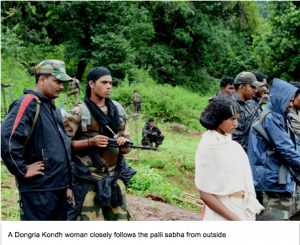 Following up on the Supreme Court order of April 18, the Odisha state government selected 12 villages—seven from Rayagada and five from Kalahandi district—to take a call on the proposed bauxite mining inside Niyamgiri hill range and whether it will infringe on their religious and cultural rights. A joint venture of the Orissa Mining Corporation Limited (OMCL) and Sterlite Industries, the Indian arm of the London Stock Exchange-listed Vedanta, wants to mine the forests for bauxite, to feed Vedanta’s alumina refinery on the foothills of Niyamgiri hills at Lanjigarh.
Following up on the Supreme Court order of April 18, the Odisha state government selected 12 villages—seven from Rayagada and five from Kalahandi district—to take a call on the proposed bauxite mining inside Niyamgiri hill range and whether it will infringe on their religious and cultural rights. A joint venture of the Orissa Mining Corporation Limited (OMCL) and Sterlite Industries, the Indian arm of the London Stock Exchange-listed Vedanta, wants to mine the forests for bauxite, to feed Vedanta’s alumina refinery on the foothills of Niyamgiri hills at Lanjigarh.
“Why have you braved the rains, the mud and slush and climbed uphill to come all the way here today?” asked a spirited Rameswar Gouda before reminding, “I have never studied in a school, never been to a hospital and is alive today only because of these forests and streams.”
Jamu Gouda, asserting his right to worship the Niyamgiris said, “if you plan mining here, the rivers of Nagaveli and Vamsadhara (originating in the hills) will flow with our blood.” Gajendra Gouda took a dig at Vedanta: “We have lived here for hundreds of years. We are happy in our mud huts and don’t need brick houses. Vedanta can go back to London and mine there.”
At the end of the meeting, villagers insisted that district judge Jena should sign before they did. It took some cajoling by activists and panchayat officials before residents understood the procedure that Jena is an observer, not a participant. The mistrust runs deep, Gajendra Gouda told me before I left the village: “in the final copy they did not write about hospitals and schools. The never write our words exactly?”
This is from Tadijhola, the third pallisabha, by Susanta Dalai:
“We collects lots of Medicinal plant,mushroom,mango,jack fruits etc in the periphery of Niyam Giri. We are staying in such a place where there is no availability of medical,school,road but we all are happily living without any hurdle.We all are getting surprised that,like today we never have seen any govt. officials in our villages before but today all the govt. officials are hurry for Pallisabha and assuring us for providing Indira Awas Yoyana ,Old age pension card,BPL and title of land .if they are worry for us where was this emotion in past days for us ? Our Cattle and goat grazing in hill tops and we all worship to our Niyam Raja if Vedanta digs this mountain (PAHAD) where we will live and where our cattle would go for grazing.We all are here because of Niam Raja.if it is needed we may sacrifice to ourselves for the cause of Niyam Raja , but we wont give our Niam Raja to Vedanta Company.This was the collective voice of Tadijhola Villagers against Mining.
Tadijhola village is a Non tribal communities they belongs to Gaud Caste (OBC).But they all are coming under the Other traditional Forest Dwellers (OTFD) according to Forest Right Act-2006.No single house holds have applied to SDLC for Individual Rights (Form -A),Community Rights (Form -B) and Community forest resource right ( Form -C).
19 out of 22 have participated and given their opinion in presence of District Judge (Vigilance cum ADM Mr Pramoda Kumar Jena).The Tadijhola villagers made request to judge for cancellation of Vedanta Mining Proposal in Niyam Giri. They strictly said ,if Vedanta will make plan for bauxite we all will go and kill to everyone in the Company members .As per the strong opinion of communities ,district judge passed the resolution in the Pallisabha for cancellation of Mining Proposal.At last,district judge realized and said no to mining here,if Mining project will happen in Niyam Giri all the communities will be affected their principal livelihoods and Niyam Raja will be affected severely. ”
Down to Earth
Kunakadu invokes tribal martyrs at Niyamgiri palli sabha
The fourth rejection in a row for proposed bauxite mining was expected; that a diminutive tribal wanted to remain ‘illiterate’ forever wasn’t
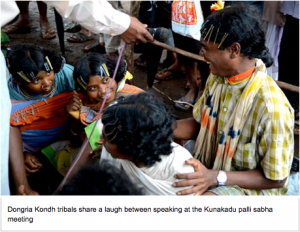 Kunakadu, a tribal hamlet in Kalahandi district of Odisha echoed the decision of the previous three palli sabhas on Wednesday. The scenic hill top village unanimously rejected proposed bauxite mining in the Niyamgiri hill range. Early on, the mood was set by an animated Tunguru Majhi who spoke for 20 minutes, directing his words at district judge Pramod Kumar Jena, appointed observer to the village council proceedings by the Supreme Court of India. Jena listened to Majhi with rapt attention, taking notes in between.
Kunakadu, a tribal hamlet in Kalahandi district of Odisha echoed the decision of the previous three palli sabhas on Wednesday. The scenic hill top village unanimously rejected proposed bauxite mining in the Niyamgiri hill range. Early on, the mood was set by an animated Tunguru Majhi who spoke for 20 minutes, directing his words at district judge Pramod Kumar Jena, appointed observer to the village council proceedings by the Supreme Court of India. Jena listened to Majhi with rapt attention, taking notes in between.
“’Jharna, pani, paban, patra… sob loss hai jibo’ (streams, water, air, leaves… everything will be lost)… Niyamgiri is our medical centre… our ‘jani, bejuni’ (village priest and priestess) collect medicinal plants to treat our children. Do understand before you leave that the government has no right over these hills,” said a diminutive Majhi. “Like the Brahman and the Kayastha worship lord Jagannath, we worship our Niyamraja. We will die like Birsa Munda and Rindo Majhi (both Munda and Majhi led tribal uprising against the British) if you don’t give up now. We are a ‘murkhya jati’ (illiterate lot) who will never listen to you.”
Kunakadu is one of the 12 villages—seven from Rayagada and five from Kalahandi district—selected by the Odisha government to decide on proposed bauxite mining and whether this will infringe on the religious and cultural rights of the tribal forest dwellers. The public referendum follows the Supreme Court decision on April 18, directing palli sabhas or village councils to take a final call. A joint venture of the Orissa Mining Corporation Limited (OMCL) and Sterlite Industries, the Indian arm of the London Stock Exchange-listed Vedanta, wants to mine the Niyamgiris for bauxite, to feed Vedanta’s alumina refinery on the foothills of Niyamgiri hills at Lanjigarh.
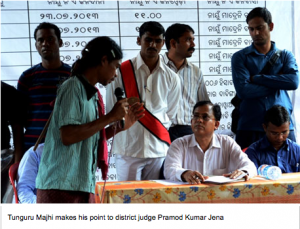 The palli sabha in the Dongria Kondh tribal hamlet was rather lacklustre after Majhi’s spirited speech. The mood was like one seen in a match already won. All of the 23 voters spoke, mostly in their tribal language, Kui. The difference was lost on the panchayat official who translated Kui to Odiya for the audience. After two days of translating the endless nos greeting Vedanta proposal, he parroted a standard text: “we worship the entire Niyamgiris. We get ‘phala, mula, kanda’ (fruits, roots, tubers). We will give Niyamgiri over our dead bodies.” He invoked death in abundance, even when it wasn’t mentioned by the speaker!
The palli sabha in the Dongria Kondh tribal hamlet was rather lacklustre after Majhi’s spirited speech. The mood was like one seen in a match already won. All of the 23 voters spoke, mostly in their tribal language, Kui. The difference was lost on the panchayat official who translated Kui to Odiya for the audience. After two days of translating the endless nos greeting Vedanta proposal, he parroted a standard text: “we worship the entire Niyamgiris. We get ‘phala, mula, kanda’ (fruits, roots, tubers). We will give Niyamgiri over our dead bodies.” He invoked death in abundance, even when it wasn’t mentioned by the speaker!
The palli sabha also rejected two community claims to the forest that residents said were not submitted by them. “You can file individual and community claims under Forest Rights Act, 2006, at a later date,” the assistant district welfare officer, Uttam Kumar Mohanty, informed the village council.
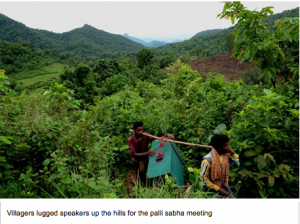 Kunakadu tested the limits of those paying a visit. All except the tribals were panting after the steep climb, slippery after the previous night’s rain. I was elated to see “Jatrakudi penu”—a wooden structure representing a local deity at the entrance to every Dongria Kondh hamlet to ward off the evil—for it meant the end of an arduous trek. After the meeting was over, all and sundry were invited for a steaming lunch of rice and vegetables served on “siali” leaf plates. Forest dwellers arranged for a simple meal, every household contributing their share in kind.
Kunakadu tested the limits of those paying a visit. All except the tribals were panting after the steep climb, slippery after the previous night’s rain. I was elated to see “Jatrakudi penu”—a wooden structure representing a local deity at the entrance to every Dongria Kondh hamlet to ward off the evil—for it meant the end of an arduous trek. After the meeting was over, all and sundry were invited for a steaming lunch of rice and vegetables served on “siali” leaf plates. Forest dwellers arranged for a simple meal, every household contributing their share in kind.
